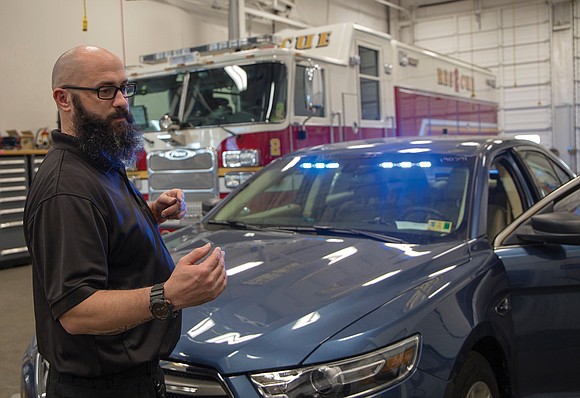Small City of Richmond Radio Shop produces big results
4/19/2019, 6 a.m.

• Interior car temperatures monitored by a cellphone application.
• Lights and sirens that shut off automatically when the vehicle is put into park.
• Windows that come down when the interior gets too hot.
• Cameras that record activity in front and behind a vehicle.
These are just a few examples of the whiz-bang technology a small team of Richmond electronic specialists are installing in cars, trucks and other motorized equipment belonging to the city and other governmental entities.
Led by supervisor D.C. Creasy, the team that also includes two other full-time and one part-time staff works out of the City of Richmond Radio Shop, also known as the Technical Division of the Department of Emergency Communications. It’s located at 3506 Hopkins Road in South Side.
“These days, it’s a lot more than radios,” said Karen L. Gill, spokesperson for Emergency Communications.
The division’s budget is tiny, about $1.3 million a year, while the productivity ranks high among city agencies.
In the course of a year, the Radio Shop staff will work on hundreds of vehicles, ranging from dump trucks and school buses to fire trucks, paint trucks and police cars, boats and motorcycles.
“The only thing we have not worked on is an aircraft,” Mr. Creasy said.
Communications between vehicles and with call centers are still a mainstay. The team is at the center of the $40 million city project now underway to replace public safety communications equipment in police cars, fire trucks, ambulances and other vehicles.
The city’s overhaul of public safety communications, which is expected to be completed in 2021, is part of a regional effort to make it easier for police officers, firefighters and public safety employees from different agencies to talk with one another and a dispatcher. The total cost across the region could top $150 million.
The technicians not only work on city vehicles, but they also install sensors, technology and communications equipment into vehicles belonging to Virginia Commonwealth University, Virginia Union University, the Richmond Ambulance Authority and the Richmond Metropolitan Transportation Authority, among others, Mr. Creasy said.
These organizations get vehicles from the manufacturer as basic models, just as an individual might order, Ms. Gill said. The vehicles are then sent to the division’s shop to be upgraded with the technology that turns them into specialized vehicles.
For example, the city fire marshal’s SUV has been equipped with sensors that monitor conditions in the space in which dogs that assist in arson investigations ride.
The team also adds specialized lighting to police detectives’ cruisers.
“The technology is so detailed now, we can do really crazy stuff on the computer,” Mr. Creasy said. “We get to build some really cool things. We get to make different light patterns and functions and put them where you can’t even see them. We’re pretty good at hiding stuff.”
Mr. Creasy said he and his staff work with governmental customers to learn about problems they might have and to find solutions, such as the automatic shutoffs of sirens and lights for ambulances.
That has been his focus, he said, since he moved into the Richmond shop in 2015 after working as an installer in Chesterfield County’s radio shop. Promoted to supervisor in 2017, he said the ability to solve problems is the top skill he looks for in hiring technicians.
“Our people have to think on the fly to problem solve,” Mr. Creasy said. “If things are not working when they should be, the people in our shop have to figure out why. If we can’t get the parts we need, then we make them. If what we’re doing isn’t working, we have to change how we work.”
He said the trend has been for governmental agencies to outsource radio work. But he said the city’s radio shop has proven itself. He said few private shops can match the city team’s ingenuity, speed and experience in electronics, mechanics and metal fabrication.
Plus, the work is fun for people who like working on cars and trucks, Mr. Creasy said.
“Instead of fixing the brakes, changing oil filters or repairing engines, our team gets paid to install cameras in vehicles,” he said. “Who wouldn’t like that?”






